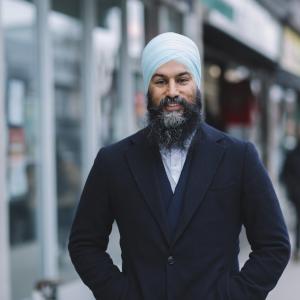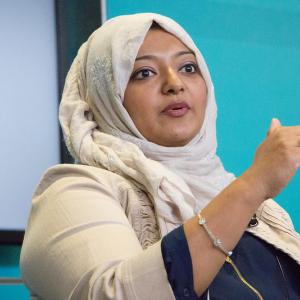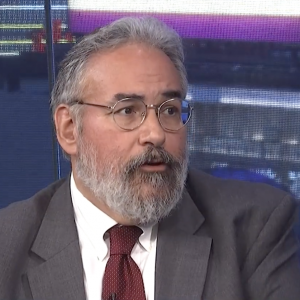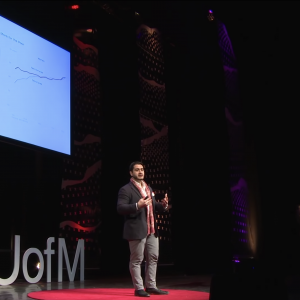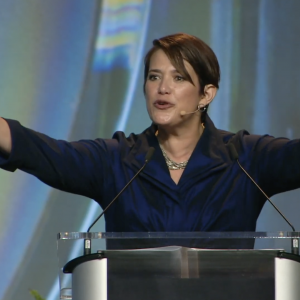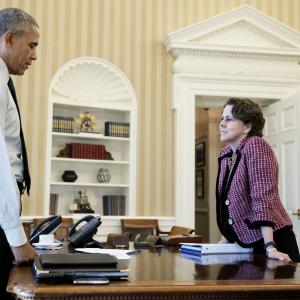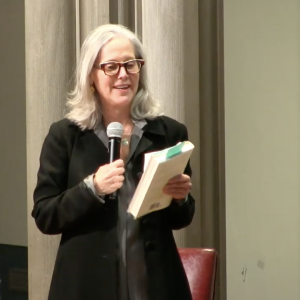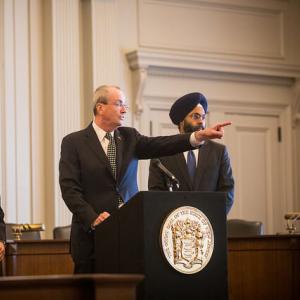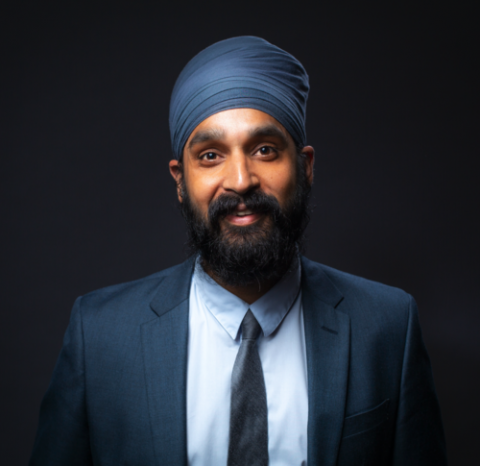
Simran Jeet Singh is a visiting professor at Union Theological Seminary and senior religion fellow for the Sikh Coalition. He is also the host for Spirited, a new interview-based podcast on faith, spirituality, and activism.
An accomplished professor, author, and dad-joke teller, Simran uses personal stories, humor, and a love of pop culture to connect with people. That’s because Simran understands that marginalized groups will not lecture their way into dignity. Empathy is nurtured through personal relationships and Simran has forged these connections through a variety of mediums, including social media, regular columns and providing on air commentary for programs like NPR, The Daily Show, and the BBC.
Simran has recently added author to his resume; his picture book on Fauja Singh, the world’s oldest marathoner, will be published by Kokila/Penguin Random House in 2020. His adult non-fiction book on Sikh wisdom for our current times will also be published by Penguin Random House in 2021. Simran is also the author of "Covering Sikhs," a guidebook to help journalists accurately report on the Sikh community. ,p>Born and raised in San Antonio, Texas, Simran is a diehard Spurs fan and an avid marathoner. He lives in Manhattan, New York with his wife and two daughters.
Posts By This Author
The Buddhist Spirituality That Sustains Moms Demand Action's Shannon Watts
Just a few years ago, Shannon Watts stepped back from her role as a communications executive to be a stay-at-home mother of five. Today, she is one of the most prominent activists in the world. Shannon is the founder of Moms Demand Action for Gun Sense in America, the leading force for gun violence prevention, with chapters in all 50 states and a powerful grassroots network that has affected change at local, state, and national levels.
'We're All Inextricably Linked and Connected'
A Conversation with Jagmeet Singh
Jagmeet Singh is leader of Canada’s New Democratic Party. His campaign to become the country’s next prime minister made international news — in part because of his progressive politics, and in part because of his appearance as a practicing Sikh. In 2019, Singh became the first racial and religious minority to lead a major political party in Canadian history. He remains one of the highest-ranking politicians and most prominent faces in Canada.
Rabia Chaudry on the Urgency of Justice Work
Rabia Chaudry is a Pakistani-American attorney, author, and podcast host. I first learned about her while listening to the first season of Serial, a groundbreaking podcast that covered the disturbing case of Adnan Sayed. Since then, Rabia wrote a book about his case called Adnan’s Story. She then started her own highly acclaimed true-crime podcast, Undisclosed, and she is now also co-host of The 45th podcast, which looks at important developments coming out of the White House that merit a second look.
Rabbi Brad Hirschfield: The Fanatic Is the One Who Believes God Is Always On Their Side
In 2008 Rabbi Brad Hirschfield published You Don’t Have To Be Wrong For Me To Be Right: Finding Faith Without Fanaticism. In this book, he talks about his own first-hand experience of falling into fanaticism and what it took for him to climb out of it. I was fascinated by this perspective then, and given what’s happening in our world today, I’m even more fascinated by it now.
'Why I'm Optimistic' Abdul El-Sayed on Faith, Medicine, and Hope
Abdul El-Sayed, a Michigan-born American of Egyptian descent who, last year, very nearly became the first Muslim governor in U.S. history. Abdul is a professor and medical doctor turned politician and civil servant, who has a fantastic new podcast with on public health called America Dissected. Additionally, his new book, Healing Politics, will be out on May 5, 2020 and is now available for pre-order.
Activist Charlotte Clymer on Her Faith, Military Service, and Vision for the Future
Charlotte Clymer is an activist, writer, and Twitter savant. She’s a veteran who served with the U.S. Army from 2005 to 2012, and she serves currently as the press secretary for the Human Rights Campaign, an LGBTQ civil rights organization. Charlotte is one of the most prominent trans activists in the country, and I wanted to learn more about how her personal experiences with poverty, the U.S. military, and being transgender have shaped the person she has become today. I’ve learned so much through our friendship over the years, and I’ve learned even more in this conversation about the challenges she’s encountered, and how and why she remains active in seeking justice and civil rights for all.
The Double Work of Women in Church Leadership
A Conversation with Rev. Dr. Amy Butler
The Rev. Dr. Amy Butler is one of the most prominent pastors in modern America. She recently served as Senior Minister for the historic Riverside Church in New York City — the first woman to ever hold that position. Butler has dedicated much of her time and attention to smashing the patriarchy within the church — what many describe as shattering the glass ceiling.
Lifting the Fog on Our History of Violence
A Conversation on Hope with Immigration Expert Cecilia Muñoz
Cecilia Muñoz is one of the foremost experts on immigration in America today. In 2008, President-elect Barack Obama appointed her to his White House staff as the Director of Intergovernmental Affairs and later was appointed as Director of the Domestic Policy Council. The interview has been edited for length and clarity.
Dr. Serene Jones on Owning Up to Legacies of Racism
Dr. Serene Jones serves currently as president of the historic Union Theological Seminary in the City of New York — the first woman president in the institution’s 183 years of existence. Among her many illustrious achievements, Jones also served as president for the American Academy of Religion, the world’s largest association of scholars in the field of religious studies. Jones grew up in Oklahoma with her family, which she describes as “progressive and deeply Christian.”
Mark Charles on the Nation's Selective Amnesia
Mark Charles describes himself as a dual citizen of the United States and the Navajo Nation. He is making history this year by becoming the second-ever Native American to run for president of the United States of America. I recently heard Mark speaking at the Aspen Institute about how white supremacy infiltrated Christian theology to justify colonialism, oppression, and genocidal violence. I also read his recent book on this topic co-authored with Soong-Chan Rah titled Unsettling Truths: The Ongoing Dehumanizing Legacy of the Doctrine of Discovery.
Who Are the Sikhs and What Are Their Beliefs?
The racist attacks spiked again after 9/11, particularly because Americans did not know about the Sikh religion and conflated the unique Sikh appearance with popular stereotypes of what terrorists look like.
Why We Should Call Chris Harper Mercer by His True Title — A Terrorist

Douglas County Sheriff John Hanlin, center, in Roseburg, Ore. Image via Steve Dipaola / REUTERS / RNS
In our modern world, “terrorist” is a racially coded word we have reserved primarily for describing Muslims engaged in acts of violence. We are quick to label violence as terrorism the moment we learn that the perpetrator is Muslim, yet we immediately stop short when a non-Muslim commits the same act of violence.
Mercer murdered nine innocent people to further his political ideology and worldview. So why don’t we call him a terrorist? As a nation we can’t continue to have it both ways and expect to adequately address the true threats we face together as a country.
Initial reports from the Los Angeles Times referred to him as a “shooter,” CNN.com called him simply a “gunman.” In the case of Roof, initial reports from USA Today referred to him as a “lone wolf,” former Texas Gov. Rick Perry described the shooting as “an accident,” and an expert interviewed by CNN quickly raised the question of mental illness .
The framing of mental illness plays into classic colonialist and Orientalist discourses in which the colonized are presumed to be savage and irrational, whereas the colonizers are rational and civilized. In other words, we presume that a violent white person must be mentally ill, whereas we assume that a person of color is either predisposed or conditioned to be violent.

